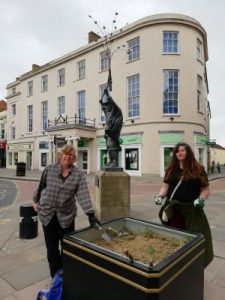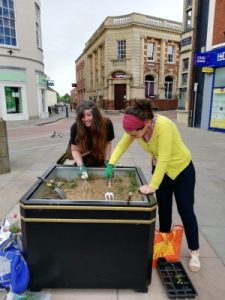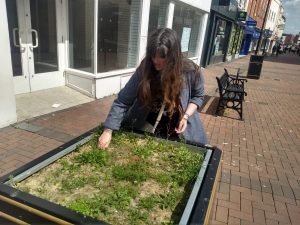
It wasn’t long ago that Bridgwater Town Council contributed some money to the project to revamp Bridgwater’s Fore Street which included some large tubs for planting flowers to further enhance the street scene. However, with one thing and another , not to mention the Covid crisis, the large tubs have been left empty-apart from an increasing number of fag butts! This week Westover councillors Kathy Pearce and Li Gibson took things into their own hands and (after a chat to Clean Surrounds) planted their own seeds and are now busy tending them -and asking the public to also keep an eye out.
Pollinator Pathways

Li adds “One of the biggest threats to pollinating bees and insects is the lack of widespread flowering plants that connect areas and feeds them. In a town where these more natural areas are disconnected this can become a break in their habitat . ‘Pollinator Pathways’ create native plant corridors which can contribute and preserve all native wildlife. If we connect existing isolated green spaces and create an urban environment where pollinators can thrive we are more likely to feel connected with our urban environment, and this in the short and long term assists pollinators. If we feel socially more connected we can become more aware of how a balanced ecology is fundamental to our health and well being. Creating a system of ecological corridor of flowering plants can only help. We can use exiting infrastructure such as road curb sides, parks, rooftops and council provided planters. As the town has many areas that can be made more friendly and hospitable to wildlife we want to see more spaces used in this way. More planting of flowers and trees is vital for us to support our environment. These seeds hopefully will become flowers for all to enjoy.”


Well done Girls. That’s a lovely thing to do. I’ll look forward to seeing them when I’m allowed out again!
Oh wonderful. Thank you so much I shall keep an eye on them when I’m passing.
Jolly good, more wild flowers the better. Note gras recently mowed, hope it will be made an iccasional practice now, to equate verges with meadows rather than tennis courts. A couple of us oldies in Homecastle House have been seeding the 2 bare/cigarette end patches around the small trees outside Lions Club on West Quay. It’s got somewhat too exhuberant lately as we have not been able to do any work on it, but a blaze of colour from marigolds at present and poppies coming on nicely. Yes, we got the OK from Clean Surrounds, who promised not to zap it with weedkiller twice a year.